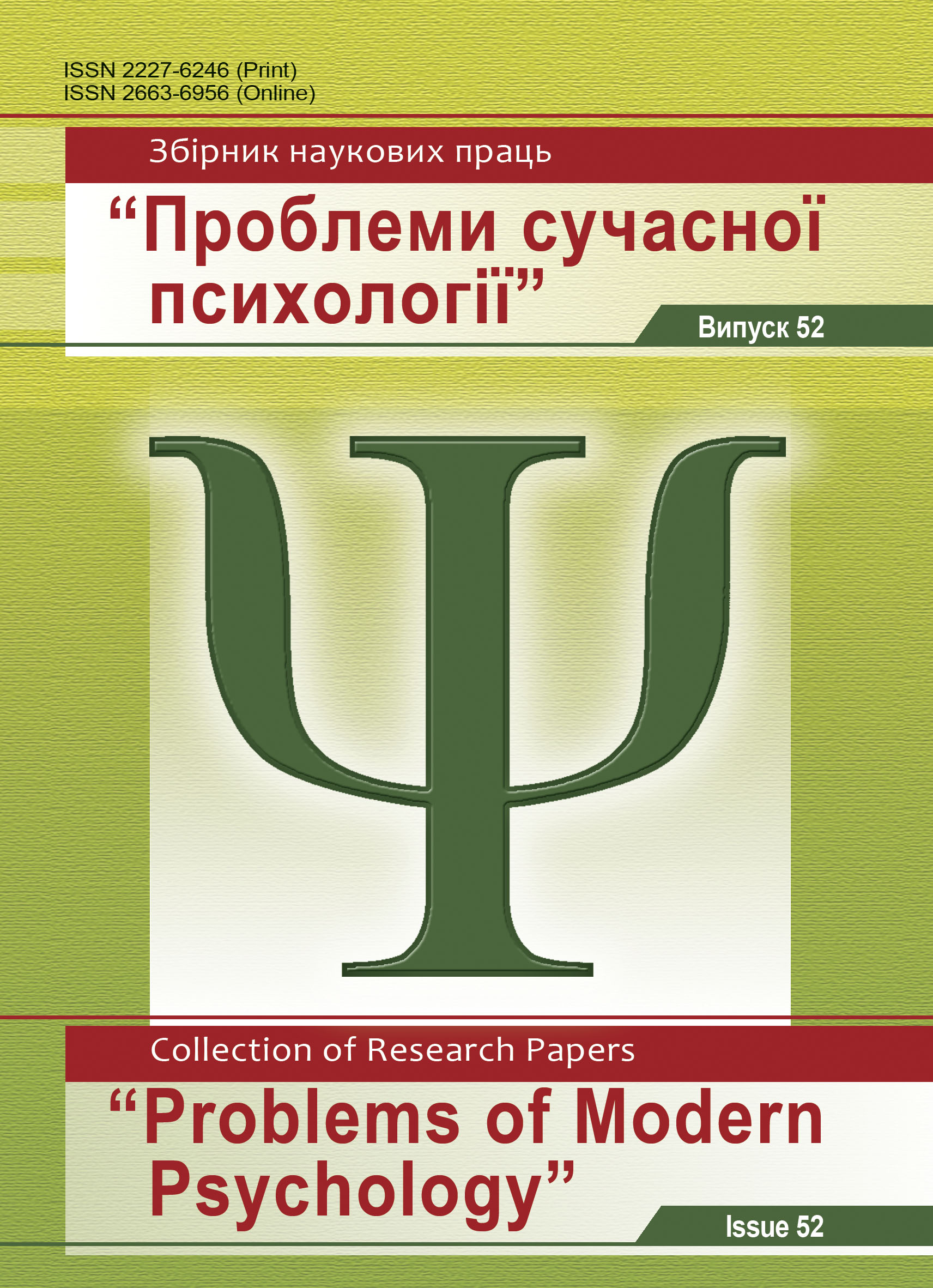Психологічні підходи до побудови монологу-розповіді
DOI:
https://doi.org/10.32626/2227-6246.2021-52.204-224Ключові слова:
монологічне мовлення, психологічні підходи, герменевтика, психолінгвістичний підхід, когнітивний підхід, психофізіологічне сприйняття, розпізнавання значення, активно-діалогічне розумінняАнотація
Мета статті – визначити комунікативні функції, які виконує монологічне мовлення; описати характеристики монологічного мовлення; показати психологічні підходи до побудови монологу-розповіді.
Для розв’язання поставлених у роботі завдань використано такі теоретичні методи дослідження: категоріальний, структурно-функціональний, аналіз, систематизація, моделювання, узагальнення.
Результати дослідження. Ми розрізняємо певні психологічні підходи до побудови монологу-розповіді. Перший підхід є герменевтичним. Герменевтика вбачає в розумінні інтерпретацію людини, яка сприймає художній текст автора; в основі цього процесу покладено уяву й інтуїцію реципієнта, що дає змогу йому не лише розкрити задум автора, а й відчути процес створення тексту. Зазначено, що процес розуміння як побудова смислів відбувається шляхом актуалізації рефлексії, найважливішого джерела досвіду, що дозволяє людині удосконалювати її особистість.
Наступний напрямок є психолінгвістичним. Доведено, що цей напрямок дослідження розуміння тексту безпосередньо пов’язаний із розумінням мовлення. Сформульовано основні положення, які в подальших психолінгвістичних і когнітивних дослідженнях були експліковані в таких аспектах: 1) діяльнісна основа мовлення, тобто її екстралінгвальні характеристики; 2) внутрішнє мовлення, або універсальний предметний код; 3) поняття значення й смислу.
Висновки. Показано, що для побудови монологу-розповіді базовим є когнітивний підхід. Визначальною ознакою цього підходу стало положення про те, що мова є лише незначною частиною цілісного явища, яке співрозмовники намагаються пізнати. Процес пізнання відбувається на основі комплексної взаємодії процесів пам’яті, фізіологічних властивостей людини, її знань про світ, соціального контексту висловлювань, способів взаємодії всієї діяльності особистості загалом та організації всіх типів знань зокрема.
Когнітивний підхід характеризується двома основними чинниками: 1) зміщення уваги дослідників від об’єкта (тексту) до суб’єкта («я – адресант»; «я – адресат»; «я – читач»); 2) зміщення уваги від чітко виявлених мікроодиниць, які розглядаються ізольовано, до одиниць, що вирізняються високим ступенем складності. У першому випадку розуміння мовлення розглядається як конструктивна діяльність суб’єкта, що здійснюється на основі його знань; у другому – як залучення складніших одиниць для аналізу розуміння замість порівняно простих повідомлень. Відповідно, поряд із текстом – об’єктом діяльності – слід також активно вивчати суб’єктів-адресантів (адресатів / читачів).
Визначено, що рух від значення до смислу визначає сам процес розуміння, у якому ми виокремлюємо декілька інтегрованих етапів, що мають змістову самостійність: психофізіологічне сприйняття фізичного знаку (слова, кольору, просторової форми); впізнання його (як знайомого чи незнайомого); розуміння його повторюваного (загального) значення в мові; розуміння його значення в певному контексті (найближчому чи далекому); активно-діалогічне розуміння (погодження – непогодження), тобто експлікація оціночного моменту в розумінні.
Посилання
Honcharuk, Nataliia, & Onufriieva, Liana (2018). Psykholohichnyi analiz rivniv pobudovy komunikatyvnykh dii [Psychological analysis of the levels of construction of communicative actions]. Psycholinguistics. Psykholinhvistyka. Psikholingvistika – Psycholinguistics. Psycholinguistics. Psycholinguistics, 24 (1), 97–117. Pereiaslav-Khmelnytskyi : FOP Dombrovska Ya. M. DOI 10.31470/2309-1797-2018-24-1-97- 117 [in Ukrainian].
Maksymenko, S., Тkach, B., Lytvynchuk, L., & Onufriieva, L. (2019). Neiropsykholinhvistychne doslidzhennia politychnykh hasel iz zovnishnoi reklamy [A neuropsycholinguistic research of political slogans from outdoor advertising]. Psycholinguistics. Psykholinhvistyka. Psikholingvistika – Psycholinguistics. Psycholinguistics. Psycholinguistics, 26 (1), 246–264. Pereiaslav-Khmelnytskyi : FOP Dombrovska Ya. M. DOI 10.31470/2309-1797-2019-26-1-246-264 [in Ukrainian].
Brédart, S. (1991). Word interruption in self-repairing. Journal of Psycholinguistic Research, 20, 123–137. Retrieved from https://doi.org/10.1007/bf01067879.
Cilibrasi, L., Stojanovik, V., Riddell, P., & Saddy, D. (2019). Sensitivity to Inflectional Morphemes in the Absence of Meaning: Evidence from a Novel Task. Journal of Psycholinguist Research, 48, 747–767. Retrieved from https://doi.org/10.1007/s10936-019-09629-y.
Crookes, G. (1989). Planning and interlanguage variation. Studies in Second Language Acquisition, 11, 367–383. Retrieved from https://doi.org/10.1017/s0272263100008391.
Mykhalchuk, N., & Bihunova, S. (2019). The verbalization of the concept of «fear» in English and Ukrainian phraseological units. Cognitive Studies | Études cognitive, 19, 11. Warsaw (Poland). Retrieved from https://doi.org/10.11649/cs.2043.
Mykhalchuk, N., & Ivashkevych, E. (2019). Psycholinguistic Characteristics of Secondary Predication in Determining the Construction of a Peculiar Picture of the World of a Reader. Psycholinguistics. Psykholinhvistyka. Psikholingvistika – Psycholinguistics. Psycholinguistics. Psycholinguistics, 25 (1), 215–231. Pereiaslav-Khmelnytskyi : FOP Dombrovska Ya. M. DOI 10.31470/2309-1797-2019-25-1-215-231.
##submission.downloads##
Опубліковано
Як цитувати
Номер
Розділ
Ліцензія
Авторське право (c) 2021 Ногачевська Інна, Логвіна Оксана

Ця робота ліцензується відповідно до Creative Commons Attribution-NonCommercial 4.0 International License.
Редакція має повне право публікувати у Збірнику оригінальні наукові статті як результати теоретичних і експериментальних досліджень, які не знаходяться на розгляді для опублікування в інших виданнях. Автор передає редколегії Збірника права на розповсюдження електронної версії статті, а також електронної версії англомовного перекладу статті (для статей українською та російською мовою) через будь-які електронні засоби (розміщення на офіційному web-сайті Збірника, в електронних базах даних, репозитаріях та ін).
Автор публікації зберігає за собою право без узгодження з редколегією та засновниками використовувати матеріали статті: а) частково чи повністю в освітніх цілях; б) для написання власних дисертацій; в) для підготовки абстрактів, доповідей конференцій та презентацій.
Автор публікації має право розміщувати електронні копії статті (у тому числі кінцеву електронну версію, завантажену з офіційного web-сайту Збірника) на:
- персональних web-ресурсах усіх Авторів (web-сайти, web-сторінки, блоги тощо);
- web-ресурсах установ, де працюють Автори (включно з електронними інституційними репозитаріями);
- некомерційних web-ресурсах відкритого доступу (наприклад, arXiv.org).
Але в усіх випадках обов’язковою є наявність бібліографічного посилання на статтю або гіперпосилання на її електронну копію, що містяться на офіційному сайті Збірника.






